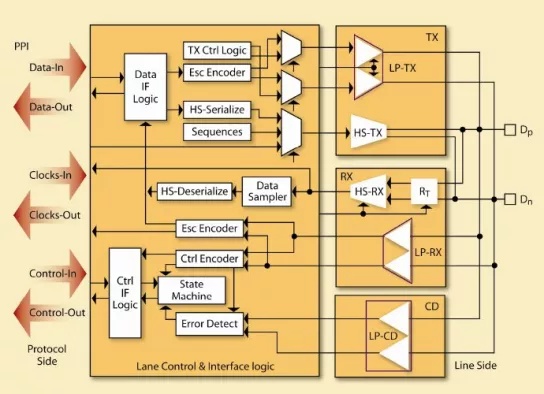MIPI D-PHY Universal IP
Overview
The MXL-PHY-MIPI is a high-frequency low-power, low cost, source-synchronous, physical Layer compliant with the MIPI Alliance Standard for D-PHY. Although it is primarily used for connecting cameras and display devices to a cost processor, it can also be used for many other portable applications. It is used in a master-slave configuration. High-Speed signals have a low voltage swing, while Low-Power signals have large swing. High Speed functions are used for High-Speed Data traffic while low power functions are mostly used for control.
Key Features
- Complies with MIPI Standard for D-PHY V1.0
- Point-to-point differential interface supporting multiple data lanes and a clock lane
- Supports both high speed and low-power modes
- Data lanes support both bidirectional and unidirectional modes
- Clock lane supports unidirectional communication
- 80 Mbps to 1Gbps data rate in high speed mode
- 10 Mbps data rate in low-power mode
- Modular design to allow for all possible configurations
- Low power dissipation
Benefits
- Supports both MIPI CSI-2 and MIPI DSI, as a transmitter and receiver
Block Diagram

Applications
- Mobile
- Displays
- Cameras/Sensors
- IoT
- VR/AR/MR
- Consumer electronics
- Automotive
Deliverables
- Specifications
- GDSII
- LVS netlist
- LEF file
- IBIS Model
- Verilog Model
- Timing Model
- Integration Guidelines
- RTL
- Documentation
- One year support
Technical Specifications
Foundry, Node
All, Upon request
Maturity
Silicon Proven
Availability
Now
GLOBALFOUNDRIES
Silicon Proven:
130nm
SMIC
Silicon Proven:
110nm
G
,
130nm
LL
TSMC
Pre-Silicon:
28nm
HPL
,
28nm
HPM
,
130nm
G
Silicon Proven: 40nm LP , 65nm LP , 130nm LP
Silicon Proven: 40nm LP , 65nm LP , 130nm LP
Tower
Silicon Proven:
130nm